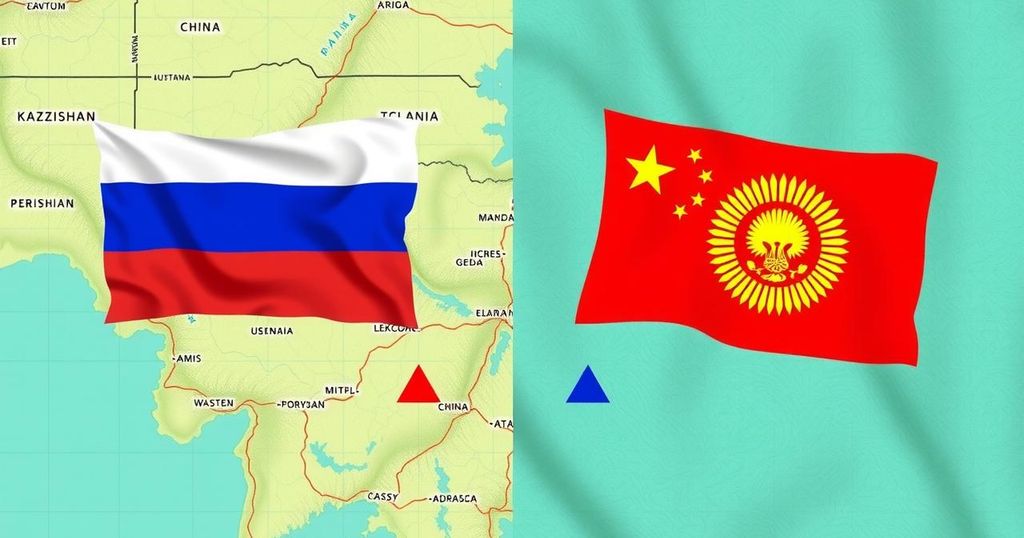Russian state nuclear corporation Rosatom is selling its stakes in uranium projects to Chinese firms, signaling a shift in Kazakhstan’s energy partnerships amidst Western sanctions. The move highlights Rosatom’s declining influence in the region and Kazatomprom’s challenges due to its association with Russia. Despite potential construction collaborations on nuclear plants, Kazakhstan appears to be increasingly aligning with Chinese interests, reshaping the dynamics of its uranium sector.
Russian state nuclear corporation Rosatom is divesting its interests in joint-venture uranium projects with Kazakhstan’s Kazatomprom, transferring its stakes to companies controlled by China, as announced in a recent press release. This strategic shift occurs against a backdrop of increasing international sanctions that have hindered Rosatom’s operations, particularly due to the ongoing conflict in Ukraine. Kazatomprom has similarly faced challenges owing to its connections with Rosatom, which have strained its ability to engage with Western markets. Notably, about 29% of Kazatomprom’s production is directed towards Europe; however, sanctions surrounding Russian stakeholders have presented reputational and operational risks.
In its recent annual report, Kazatomprom highlighted the risks associated with Russian partnerships, indicating that various entities within Rosatom and individuals in the Russian nuclear sector are under sanctions. As part of its divestment strategy, Rosatom’s subsidiary, Uranium One Group, has sold a significant stake in Kazakhstan’s Zarechnoye mine and is preparing to divest its share in the Khorasan-U joint venture, further consolidating China’s dominant position in Kazakhstan’s uranium sector. China’s growing involvement aligns with its strategic initiatives to secure essential resources for its expanding nuclear energy program.
While Rosatom retains a stake in several of Kazatomprom’s projects, including considerable reserves held in the Budennovskoye deposit, the sales are perceived as diminishing Russia’s influence within Kazakhstan and Central Asia. Ukrainian political analyst Anton Gerashenko articulated that these moves signify a notable shift in regional dynamics, whereby Kazakhstan appears to be gravitating towards China, particularly as Russia’s credibility as a security leader has waned following its military failures in the Ukraine conflict.
Simultaneously, despite perceptions of Russian withdrawal from Kazakhstan’s uranium market, speculations indicate that Rosatom may still play a crucial role in the forthcoming construction of Kazakhstan’s first nuclear power plant, possibly as part of an international consortium that includes Chinese and Western firms. This suggests a nuanced relationship as Kazakhstan navigates its partnerships amid external pressures.
In summary, the sale of stakes to Chinese firms indicates both a restructuring of Kazakhstan’s uranium sector and a potential reassessment of Russia’s regional role. The historical context of Rosatom’s earlier acquisition strategies adds complexity to the current narrative, illustrating how geopolitical shifts can lead to significant alterations in energy partnerships.
The article discusses the recent divestment of Rosatom’s stakes in joint uranium ventures with Kazakhstan’s Kazatomprom, particularly focusing on the sale of assets to Chinese firms. This decision has arisen in response to mounting sanctions imposed on Russia due to the Ukraine conflict, which have constrained Rosatom’s global business activities. Kazatomprom’s challenges are magnified by its affiliation with Rosatom, threatening its market access and overall reputation in international uranium sales. The situation is also contextualized by historical events that showcase Russia’s ambitions in Kazakhstan’s uranium sector and the broader implications these changes may have on regional geopolitical dynamics.
In conclusion, Rosatom’s divestment of its uranium stakes to Chinese-controlled companies marks a significant shift in the geopolitical landscape of Kazakhstan’s energy sector. As the influence of Russia appears to diminish in the face of external pressures, Kazakhstan is likely to realign its partnerships, indicating a growing reliance on China for its nuclear ambitions. This transformation reflects broader trends in international relations, especially regarding energy resources and strategic alliances in Central Asia. The complexities of this relationship underscore the intricate balance Kazakhstan must navigate as it engages with global powers amidst evolving regional dynamics.
Original Source: www.intellinews.com






